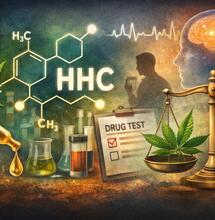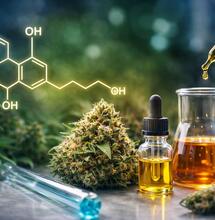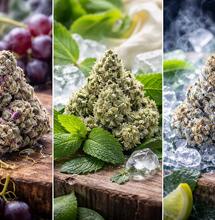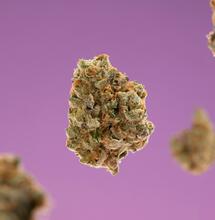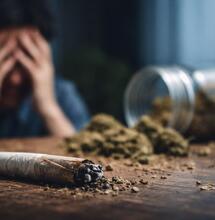What's all the buzz around THC-O?
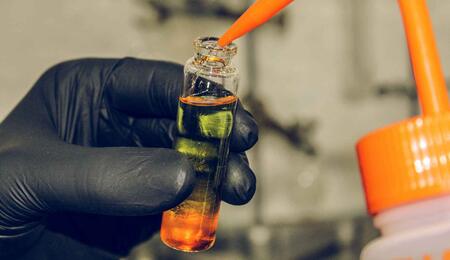
First, it was Delta 8 THC, which currently faces bans in some states. Now another synthetic hemp-derived compound is stealing the show. THC-O acetate, or simply written as THC-O, quickly found its way to consumers among Americans who don't have access to legal recreational cannabis drugs.
Technically speaking, THC-O is federally legal because it's derived from hemp. Just like Delta 8 THC. Although, one significant difference is that THC-O is billed as much stronger, much more potent than either controlled THC or its synthetic derivate Delta 8 THC. According to some research, THC-O has roughly three times the potency of regular THC, and it's already been branded as "the psychedelic cannabinoid," generating a borderline hallucinatory effect.
Hemp-derived compounds like THC-O often go under the radar, even in states that regulate legal trade and commerce of cannabis flower and other goods.
How is THC-O created?
THC-O sort of is an upgrade from Delta 8 THC. After CBD is extracted from raw hemp, and once Delta 8 THC is removed from CBD, a compound known as acetic anhydride is added to the Delta-8 THC, and bang, there you go THC-O-acetate. The acetylation of THC does not necessarily alter the compound's properties, but it's what bumps up its potency. Sounds like someone perfected their chemistry skills to extract this new synthetic analog of THC, right.
Well, you might be surprised to learn this, but THC-O is actually not so new. Records suggest that the controversial compound was first observed by US military personnel in the after-WWII period. THC-O grabbed attention as it was found to affect muscle coordination in dogs severely.
It seemed the story of THC-O went into "sleep mode" for the good next few decades. Until one day in 1978 the DEA raided a secret lab in Jacksonville, Florida, where cannabis extracts were spiced with acetic anhydride.
THC-O-acetate was ruled out to be a Class A drug in a 1995 case when UK authorities intercepted a similar lab undertaking. Acetate was also seized in New Zealand that same year. It appears, however, these few instances of THC-O being illegally extracted were isolated cases. THC-O, after all, did not prevail on the black market.
Fast forward to the present, THC-O appears to be routinely laced in edibles, tinctures, and vape cartridges. The substance looks like a thick brown liquid, and when consumed, it takes about half an hour to activate and kick in the body.
Is THC-O safe to consume?
Underresearched and unregulated, there are plenty of reasons why to remain hesitant with THC-O acetate. At present, there is poor control of product quality; you can't quite know if products containing the artificial cannabinoid used high-grade material.
Since this is a substance that originates somewhere in the underground market, there are also concerns about potentially toxic additives being added in THC-O products, including dubious thinning agents, the consumption of which might harm a healthy person.

What legal gap enabled THC-O to appear?
Similar to its cousins Delta-8 THC and Delta-10 THC, goodies laced with THC-O appeared thanks to the 2018 Farm bill, which removed hemp and hemp seeds from the Drug Enforcement Administration’s (DEA) schedule of Controlled Substances. THC-O extractors are supposedly legally protected because they are working with federally approved hemp in the lab.
Some experts have quickly pondered on the 1986 Federal Analogue Act, which postulates that any substance comparable to a Schedule I drug, which entails conventional THC, should still be classified as such. However, this interpretation of the laws backfires, as same claims can be made to cast a shadow on the legality of CBD.
As the legal loophole persists, it comes down to state regulators and legislators to tame down questionable derivatives taking over reputable markets. In the case of Delta-8 THC, the alarm was raised once the number of hospitalizations climbed over the summer, enough that the Centers for Disease Control and Prevention (CDC) had to issue a public health warning. It also triggered some states to begin installing legal measures to halt the circulation of unregulated Delta-8 THC products. Assuming a rise in THC-O-related intoxications takes hold over the following period, it's very likely it will prompt authorities to take similar actions.
For the legal sector of the industry, any incidents related to intoxication, especially those that culminate with increased hospitalizations, are a source of concern. It's something that tarnishes the hard-earned status of the industry.
For consumers, it remains up to them individually to decide whether they want to ingest a substance in their body that might make them feel sick or fall ill. It probably pays to gauge whether any cannabis product you buy is of decent quality. It's all the more easier if you come from a state where buying weed is a legal business, and where you can find an array of other super potent products that are actually approved for ingestion.
